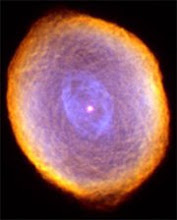The device looked like a pitchfork, and served the same basic function. Only the keypad -- contoured to fit the bright red ergonomic handle -- gave it away. In the dim evening light, Kris couldn't help but keep her eyes on the steady lambent green of its readout. Unmistakable verdant clusters showed her where the next bodies were, already scoped out and tagged by the sleek, cheerfully stickered aerostats that had arrived yesterday in a blur of skyborne polymer. She walked slowly through the thickening marsh, anonymous chemicals leaving scabrous rings on her haz-mat boots. The reflected glow from the pitchfork's keyboard regarded her from below, a strange second moon that swelled and rippled in synch with her movements.
She saw the next body a moment later. A civilian, just as the tags had indicated. Face-down, arms splayed like spokes in a senseless mandala. Just barely visible through a tangle of weeds and styrofoam.
She gritted her teeth and raised the pitchfork. Icons blinked like eager green eyes. Visored face averted, she lowered the fork's tines in a single practiced movement, only vaguely aware of the sudden yielding of flesh as the device swarmed into the corpse's increasingly porous confines. The tines extruded sensors and barely visible nanotech spores: gear beyond the carrying capacity of the aerostats, the tutorials had made a point to remind her, lest she yield to the sense of obsolescence that had characterized her stay in Florida. Over the last three months her initial paranoid suspicion that she was redundant -- a human face amidst the coastal blight -- had festered into an equally paranoid certainty. She'd come to view the omnipresent drones, airborne and otherwise, with ill-defined suspicion.
It was the clean-up, of course. The bodies. Especially the bodies. She tried not to look anymore; the pitchfork (she'd already tried and failed to quit calling it that, and it didn't help that the other members of her crew insisted on the same grisly anachronism) did most of the work, after all. The Consortium needed volunteers because it needed muscle to bear its gear -- to say nothing of the PR benefit of dispatching flesh-and-bone humans when sending in robotic surrogates couldn't have been that much more difficult.
A timer chimed. She withdrew the fork with a wince of mingled reluctance and nausea. She'd taken her day's dose of neuroinhibitors, of course; medically speaking, she shouldn't be able to conscience nausea, let alone feel it stirring in her gut.
Some things never changed.
Wednesday, July 25, 2007
Tuesday, May 15, 2007
Originally posted at Posthuman Blues
The aerostats hovered over the horizon as we made our way through the wastes. Their lights, already tenuous, played weakly across the ground, accentuating the heaped ash and leaving curved rungs of light dangling in my vision like baubles. I'd never adapted to the aerostats' presence. Even their shape seemed implacably wrong, as if they'd been snatched from some higher dimensional space and squeezed until they fit the contours of the known. As they moved they stirred up vast clouds of black dust that occluded the stars.
I mopped sweat from my brow with a peeling concert T-shirt and took a sip of ancient Gatorade from one of the bottles we'd taken from a convenience store somewhere outside St. Louis.
I mopped sweat from my brow with a peeling concert T-shirt and took a sip of ancient Gatorade from one of the bottles we'd taken from a convenience store somewhere outside St. Louis.
Sunday, May 6, 2007
Liquid flesh
Nerves took root as the liquid flesh congealed on her body, bonding with exposed muscle and stifling the flow of pus and blood that had persisted despite the application of bandages. Fresh nerves -- better than the charred originals and duly patented -- brought with them a sensory clarity that reminded her of purchasing her first HDTV flatscreen and quietly marveling at the resolution.
For long hours she immersed herself in the sheer amniotic newness of her body, aware of its patient coagulation, its inexorable stiffening into something that, ultimately, would serve her in her new life. The gloved hands of the biotechnicians slowly receded and she found herself in succulent darkness, a creature of transition.
For long hours she immersed herself in the sheer amniotic newness of her body, aware of its patient coagulation, its inexorable stiffening into something that, ultimately, would serve her in her new life. The gloved hands of the biotechnicians slowly receded and she found herself in succulent darkness, a creature of transition.
Sunday, April 29, 2007
FLURB!
I have a story in the new issue of FLURB, Rudy Rucker's science fiction webzine. I began "One Hundred Years" several years ago, "finished" it much later, and gave it an overhaul prior to its present appearance. As it's now in the public domain, I'll henceforth refrain from modifying it.
Subscribe to:
Comments (Atom)
